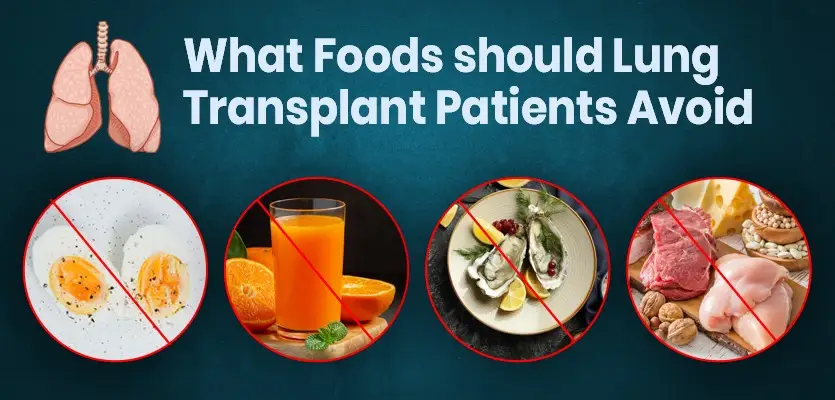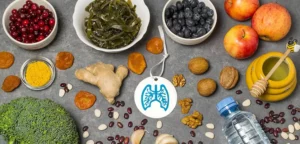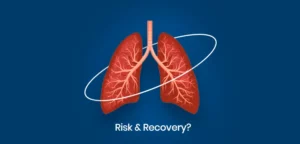Lung transplantation is an equally exhaustive surgery for both your body and mind. The recovery phase after the surgery can be challenging. A balanced diet and good nutrition plays a crucial role in the length of your recovery period. Adequate amounts of proteins and calories are required for proper wound healing. There is an increase in the nutrient requirement to lower the possibility of side effects of the anti-rejection medicines as well. Thus, these concerns have made it mandatory for the surgeon to not only perform the surgery but also monitor your diet after the surgery with the help of a qualified dietician. In this article, let us talk about the importance of diet in lung transplant patients, their nutritional requirement, mindful eating, and what you should and should not eat after lung transplantation. What Foods Help Repair Lungs After Lung Transplant?
What is the importance of adequate diet in lung transplant patients?
Diet plays an important role after you get a lung transplantation. Your body’s nutritional needs increase significantly after a transplant to accomodate for the recovery. This is because of the extreme trauma that your body goes through due to the extensive surgery. There are several metabolic changes that occur in your body after transplantation. Thus, adequate nutrition is important to meet the metabolic demand of the body and support the survival of the graft.
The major reasons for which you need a balanced diet in the post-transplantation phase are:
- Your diet must contain vitamin D and calcium to maintain bone health
- Proteins, minerals, and vitamins are required to facilitate the recovery process and promote healing
- Substantial calorie intake is also important to make you go through pulmonary rehabilitation post-surgery
- Proper nutrition helps maintain a healthy weight
- Balanced diet regulates blood pressure and blood glucose levels as well
What is the recommended food for lung transplant patients?
Nutrition plays an important role during the recovery phase for a lung transplant patient. Therefore, it is always advised that you consult your dietician and surgeon about what you should and should not eat after a lung transplantation surgery.
Some of the healthy food choices that you can include in your daily diet after a lung transplantation are:
- Meat and its alternatives: Poultry, fish, and lean meat that should be prepared without salt.
- Dried beans, lentils, and peas
- Peanut butter
- Milk: 0.5% to 1% non-fat, rice milk, soy milk
- Natural swiss cheese
- Ice milk, frozen yoghurt
- Low fat and sodium cheese and cottage cheese
- You can take 3-4 egg yolks per week
- Whole grain and unsalted bread and bread products
- Plain spaghetti, rice, noodles, and macaroni that should be cooked without salt
- Unsalted and cooked cereal
- Biscuits and waffles that are cooked using egg whites, vegetable fat, and no salt
- One serving of regular dry cereal per day
- Canned, frozen, or fresh vegetables cooked without salt
- Unsalted tomato juice
- Snacks: Unsalted popcorn, baked potato or corn chips, unsalted nuts
- Beverages: Water, nonfat milk, coffee, tea, fruit juice
- Desserts: Small portion of pie, cookie or cake
- Oil: Canola oil, olive oil, vegetable oil
- Seasonings: Lemon, onion, garlic, ketchup, mustard sauce
- Low fat frozen dinner with less than 600 mg of sodium is recommended
What is the nutritional requirement in lung transplant patients?
A balanced diet is extremely important for lung transplant patients. Your diet post-surgery must contain all macronutrients. This is because all macronutrients play different roles during your recovery phase.
Proteins
Protein is a very important nutrient during the first month after your lung transplant surgery. This is because in the first month you need to recover from the stress that the surgery has caused you. Adequate amount of protein helps heal your wounds and helps in overcoming the muscle breakdown as well. In general, 1.3 to 1.5 g of protein/kg body weight is required in lung transplant patients. However, in case of malnutrition, the daily requirement of protein can reach to around 2.5 g/kg.
Carbohydrates
Lung transplantation can affect the way in which your body uses glucose. In case of normal glucose metabolism, your doctor might recommend to you the acceptable macronutrient distribution range (AMDR) for carbohydrates, that is, 45% to 65% of total calories. In case you are hyperglycemic, that is, have high blood sugar levels, a close monitoring of blood glucose levels is required along with nutritional and medical therapy. Therefore, in such a case, it is recommended that you increase the intake of low glycemic index food in your diet to control your blood sugar levels appropriately. It is also advised that the intake of added fructose and sugar must be limited to not more than 10% of the daily total calories requirement.
Lipids
If the results of the lipid profile test done after lung transplantation are normal, then your lipid intake can be as per the AMDR for lipids, that is, 20% to 35% of the total calorie intake. Dietary and lifestyle modifications are made in case of diagnosis of dyslipidemia after the transplant surgery. Dyslipidemia refers to the imbalance in the lipid levels in the blood including high-density lipoproteins, low-density lipoproteins, triglycerides, and cholesterol.
How to eat after a lung transplant?
Now that we have discussed what a lung transplant patient should eat after surgery, it is very important to know how a patient should eat post lung transplant. Doctors advise the lung transplant patients to practise mindful eating. Mindful eating is an act of keeping in track about the food and drinks as well as the time at which you consume post-surgery. It is a form of dieting where you have food with mindfulness and consciousness. This way you need to pick up food items that provide nourishment to your body and give you a feeling of fullness and satisfaction. Mindful eating also requires you to eat only when you are hungry and not due to any emotional signs of boredom, sadness, loneliness, and stress.
Some of the major characteristics of mindful eating include:
- Avoid distractions like mobile and television when you eat
- Have food on time
- Eat slowly
- Chew your food properly
- Select the right food for your health
Mindful eating is extremely important and it can help you in your recovery phase in the following ways:
- Helps manage weight
- Monitors your daily calorie intake
- Controls your food cravings
- Helps you deal with your mood swings
- Regulates your blood pressure and blood sugar levels
- Facilitates timely eating and a healthy lifestyle
- Minimises side effects and reactions that some harmful food items can have on you
- Prevents acidity and bloating and boosts digestion
What food should lung transplant patients avoid?
Your body is not the same after a lung transplantation. A lot of metabolic processes are affected after the surgery. Therefore, your diet should be the one that supports the metabolic changes in your body and does not cause any side effects or health complications. So it is advised that you stick to the diet plan provided by the dietician and avoid unhealthy food.
Sugar
The steroid medicines that are given post surgery decrease your body’s ability to use sugar for energy. Thus, the sugar that you take through food increases the blood sugar levels in your body causing steroid-induced diabetes or more commonly referred as hyperglycemia. Therefore, to avoid the complications of steroid medicines, you must decrease your intake of concentrated carbohydrates. These foods include chewing gums, honey, soft drinks, syrups, fruit yoghurt, cookies, ice cream, puddings, and sweetened condensed milk.
Sodium
The lung transplant medicines can also increase the retention of sodium and water in your body ultimately increasing blood pressure. Thus, to restrict the intake of sodium, a “no added salt” diet is recommended after lung transplant surgery. Food that contains high sodium includes processed meat, commercial soups, processed vegetables, and beverages like buttermilk and vegetable juice.
Potassium
Certain drugs used in lung transplant patients can increase the blood potassium levels. Abnormal levels of potassium hinders the heart and muscle functioning. To maintain normal potassium levels you need to avoid fruits and juices (like orange, banana, avocado, melons, apricot) vegetables (like potato, tomato, pumpkin, and lentils), nuts, chocolates, milk, and dairy products.
At the end
Proper nutrition and a balanced diet plays a crucial role after lung transplantation surgery and facilitates proper recovery and better quality of life. It is mandatory to avoid certain food items in order to reduce side effects and risk of rejection of the graft. You can prevent infections and lead a long and good life by following a healthy diet plan and avoiding food that can be harmful for your body and cause a problem during your recovery phase. Mindful eating is thus an effective way that can achieve your health goals as well as help you recover better. Now that you know about mindful eating, food that you should include in your diet, and food that you should avoid, make sure that you plan your daily diet accordingly. It is always better to consult a qualified dietician and your surgeon for better results.
People also ask
What types of fruits should transplant patients avoid?
Certain fruits that you should avoid post lung transplantation are pomegranate, papaya, starfruit, and all other fruits that have potassium content.
What are the good sources of protein for lung transplant patients?
Adequate amounts of protein can be found in several vegetarian and non-vegetarian food options. You can meet your daily protein requirement from fish, eggs, meat (seafood, poultry, pork, beef), nuts, soy products, tofu, peanut butter, dried beans, and pasteurised dairy products like yoghurt, cheese, and milk.
Why does weight gain occur after lung transplant?
It is normal to gain weight after lung transplantation. This is due to the following reasons:
- An increased appetite due to steroids
- You tend to start eating more as you feel better
- Lack of physical exercise that doesnt allow your body to use much energy.
How can weight gain be prevented post lung transplant surgery?
You can prevent the extra weight gain post surgery by following some simple tips:
- Consume less of food that is high in fat and calories
- Include high-fibre food in your diet
- Include good sources of protein in your diet
- Include some form of exercise in your daily regime

.webp)



